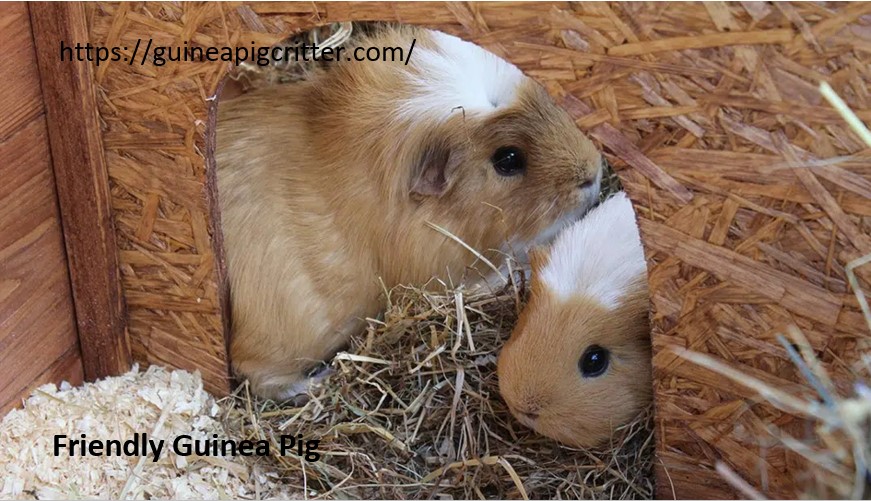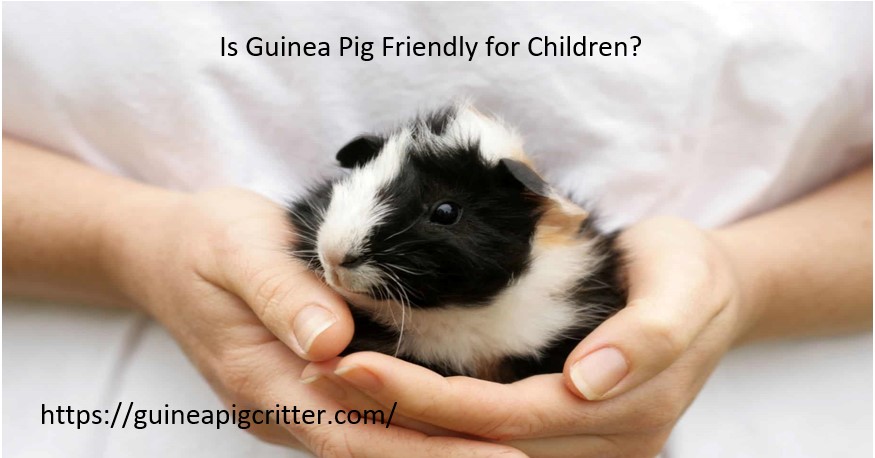Selecting a pet for a child is a significant choice. Most parents want a pet that is gentle and easy to take care of. Out of the many small pets available, guinea pigs, also known as cavies, are commonly recommended as a first pet. But the concern is whether guinea pigs are truly friendly for children.
In this blog, we will explore everything that revolves around guinea pigs, including their behavior, the advantages and disadvantages of keeping them as pets, age-appropriate recommendations, and handy advice for families that are thinking of bringing these charming little friends home. You will understand all the aspects surrounding the decision and whether a guinea pig fits the bill.
See this post:-Is guinea pig bite safe?
What further differentiates Guinea pigs as pets?
When it comes to first pets, many parents suggest children have a rabbit, a hamster, or even a small puppy. Guinea pigs fills a unique slot.
Calm temperament – Guinea pigs tended to be less aggressive. Unlike some of the other pets, guinea pigs are a lot more gentle and relaxed.
Social Nature – Also known to be social creatures, guinea pigs enjoy the company of other pets and humans, therefore increasing the joy they bring as a pet to children.
Longevity – Children can form strong emotional bonds with them since they outlast most small rodents, living 5 – 8 years.
Friendly guinea pigs make good pets as they are easy to tend to, which can make them a good fit for families.
Why Children Love Guinea Pigs
Calm Natured and Non Violent
Their natural calm nature means they rarely bite or scratch, which is a big advantage for children. More importantly, as a child, one is less likely to get hurt, which increases the level of trust they can develop with the guinea pig.
Social and Variety of Activities
Unlike some small pets, guinea pigs are quite social and enjoy wheeling, or vocalizing, popcorning, which are small leaps of joy. These behaviors are not only fun to watch, but also endearing for children.
Simple Life Skills
Feeding, cleaning the cage, and interacting with the guinea pig are some of the basic life skills that children can learn to manage through caring for a stuffed animal. Moreover, unlike dogs, guinea pigs are not as demanding in their care, as they do not need to be walked, which makes their care child’s friendly.
Safe Size for Children
The sizes of hamsters and gerbils make them challenging for children to hold safely. Rabbits, in contrast, are larger and may kick when agitated. Guinea pigs sit perfectly in between both of these extremes. They are large enough to be handled and small enough to be cuddled.
Emotional Bonding
Most children that own guinea pigs tend to call them “little friends.” Guinea pigs respond to voices, recognize their owners, and enjoy gentle cuddling. This bond is crucial for development as it promotes empathy and compassion.
Things Parents Should Know Before Getting a Guinea Pig
Even though guinea pigs make great companions, they do require a bit of care. To ensure both a child and a guinea pig are well taken care of, parents must be informed of their needs.
Cage and Living Space
Guinea pigs require a spacious cage with good ventilation. For a single guinea pig, 7.5 square feet is the minimum. For a pair, 10.5 square feet is the minimum. Compromised space can lead to stress and health issues.
Daily Maintenance
Some pets can be fed once a day, but with guinea pigs, fresh hay, clean water, and vegetables are a must on a daily basis. Each guinea pig also needs some vitamin C supplements.
Caring Routine
Every guinea pig enclosure requires spot cleaning every day and a full cleaning at least once a week. Children can assist with some simple tasks, but adult supervision is necessary to ensure the cage is kept odor-free and the animals do not fall ill.
Caring Commitment
Guinea pigs can live for 5 to 8 years. Families with children are encouraged to shoulder the responsibility, keeping in mind that children’s interests are likely to change.
Health Issues
Some common health issues include respiratory infections, dental problems, and bumblefoot, which is a foot condition. Regular vet visits are a must.
Best Age for Kids to Have Guinea Pigs
Certain age brackets are not ideal for guinea pig caretaking.
Toddlers
Not ideal. Children under five years old are likely to squeeze or drop guinea pigs. While children this age can interact with guinea pigs under strict adult supervision, they should not be the main caregivers.
School Age Children
Wonderful. Children in this age group can learn the proper techniques for handling and feeding the guinea pig, and cage maintenance. While they can be given more independence, adult supervision is still necessary for routine tasks to ensure proper management and consistency.
Teenagers
Fantastic age for self-sufficient caretaking. Older teens are able to take full responsibility for the animal, but parents should still offer backup support.
Safety Protocols for Children and Guinea Pigs
To ensure the safety of your children and guinea pigs, the following guidelines are recommended.
Supervised Handling– Always supervise children while holding or playing with guinea pigs.
Teach Gentle Touch– Encourage children to use a more delicate method, like cradling from the bottom, to lift instead of grabbing from above.
Quiet Environment – Guinea pigs are sensitive to loud noises and sudden movements.
No Rough Play – Guinea pigs should not be placed on their high surfaces, chased, or squeezed in a manner that places them in danger of falling.
Cleaning their hands – Illness prevention requires washing hands both before and after handling guinea pigs.
Pros and cons of children having guinea pigs as pets
Pros:
Very good-natured and sociable
Ideal size for children
Very engaging and communicative
Develops a sense of responsibility
A long lifespan means more years of bonding
Cons:
Requires care and fresh feed daily
Cleansing the cage is a daily task
Can be expensive in terms of veterinary care
Not appropriate for young toddlers without adult supervision
Gentle but sensitive health (can easily become stressed or sick if neglected)
This comparison explains why guinea pigs tend to be an ideal balance of friendliness and manageability for children.
Advice for Parents thinking of Getting Guinea Pigs
Get a Bonded Pair First – Guinea pigs are social animals that do best in the company of other guinea pigs.
Spend money wisely on an appropriate cage because a larger cage will always provide more benefits. For optimal ventilation and space, consider C&C cages.
As far as family habits go, create a schedule. For example, feeding the animals is simple and can easily be done by the younger family members. In contrast, cage cleaning is more intensive and can be handled by the parents.
Adopt, Don’t Shop – A caring shelter has many guinea pigs looking for forever homes.
Read Together – Educate children about guinea pig care through age appropriate books or websites.
Guinea Pigs Compared With Other Small Pets
Looking for a new pet, many parents may compare guinea pigs with other small animals like hamsters, rabbits, or even fish. Each pet has its pros and cons but unlike other small animals, guinea pigs tend to stand out as the most balanced option.
Hamsters for instance, are nocturnal and tend to bite when startled. Unlike them, guinea pigs are awake during the day and much gentler, which is easier for children to interact with. Compared to rabbits, guinea pigs take up significantly less space.
They are also easier to manage when it comes to wheel kicks and scratches. Though fish are a low-maintenance pet, they don’t offer the same companionship guinea pigs do. Overall, guinea pigs are one of the best small pets for families with children as they combine friendliness, interactivity, and a simple care routine.
Personal Narratives: Kids and Guinea Pigs
In my opinion, one of the best things about owning guinea pigs is to see the bond they form with children. Many families look at their guinea pigs not just as animals, but as loving companions that provide joy and teach important lessons.
Helping Timid Kids Build Assurance
Many parents have observed that their shy and introverted kids become more confident and open after they get guinea pigs. The act of talking to, feeding the animal, and sitting next to the cage helps children to be more confident and easier to open up.
One mother recounted the case of her daughter, who used to be scared of very big animals, slowly becoming more open after regularly looking after her guinea pigs. The gentle inseam di their squeaks and the pets’ friendly demeanor made her feel safe and supportive.
A Daily Schedule That Promotes Accountability
knowing that guinea pigs rely on them for food, water, and affection, children do their best to fulfil these requirements. Families often say their children become motivated to complete simple chores like providing veggies or refilling the water bottle.
Consider the case of an 8-year-old who was so happy to share how he feeds both of his guinea pigs a slice of cucumber every morning before school. These simple tasks certainly shaped his sense of responsibility and provided him with a sense of achievement.
Emotional Support and Providing Companionship
Guinea pigs provide even greater value by providing emotional comfort. Children that are stressed from school work are comforted by spending time sitting with their guinea pigs. Many kids talk to their pets as though they are recounting secrets to a reliable confidant.
One parent recounted how her son would sit beside the cage and “narrate,” which was a beneficial strategy for him to manage school-related anxiety and improve his overall sleep quality.
Providing Fun and Entertainment for the Family
Stories about the family’s laughter also stem from the amusing antics of guinea pigs. Children are delighted to see their pets squeak for food, pop around the cage and even follow them during their time on the floor.
Some kids even create for their guinea pigs obstacle courses and tunnels which makes family playtime enjoyable and imaginative. Through these ways, these little pets provide unending joy and entertainment for the family.
Life Lessons That Stay Forever
The most significant lesson that families emphasize is the one that guinea pigs teach: love and care come with responsibilities. Children understand that a pet is not a piece of merchandise, but a creature that has emotions and requires nurturing. These lessons often stay with children long into the future, making them more caring and empathic.
Read also :-Do guinea pigs have four teeth?
Common Questions and Answers
-
Is it ok for kids to hold guinea pigs?
Of course. guinea pigs are both safe to children. They are gentle and fairly large so they will not get hurt easily. Children can hold them without the guinea pig slipping out of their hands and the guinea pig not biting. That said, toddlers and young children need to be closely monitored.
-
Is there a preferred age for children to own guinea pigs?
The better age range is 6 and older to the lower teenage years; children are able to command and toddlers can also interact but not handle them unsupervised. Feeling comfortable handling and caring for a guinea pig is a very good skill.
-
Are guinea pigs receptive to being held by children?
Absolutely, provided the guinea pigs feel secure and bonded to their owners, most will appreciate gentle cuddling. However, each guinea pig has a different personality. Some can be more shy and will take time to warm up.
-
How much care do guinea pigs need daily?
Guinea pigs need daily access to fresh hay, vegetables, and water. They also need daily spot cleaning and a full weekly clean of their cage. To promote social behavior and happiness, at least 30 minutes of playtime or interaction is needed daily.
-
Can a guinea pig teach children responsibility?
Absolutely! Feeding schedules, proper hygiene, caring for pets, and the ability to show compassion are all skills children can learn from looking after a guinea pig. It’s a fantastic way for children to learn responsibility while at the same time strengthening their relationship with their pet.
Final Thoughts
So, is a guinea pig friendly for children?
The answer is a resounding YES, but with a few stipulations. Guinea pigs are gentle, loving, and entertaining, all of which make them a superb pet for older children and teens. Still, they cannot be classified as “low-maintenance” pets. There is a need for daily feeding, cleaning, and attentiveness.
If parents actively assist and divide tasks with their children while ensuring the children are committed for the long haul, guinea pigs can be an incredibly beneficial pet for the family. They are great companions and also help to instill the values of responsibility, compassion, and affection.


